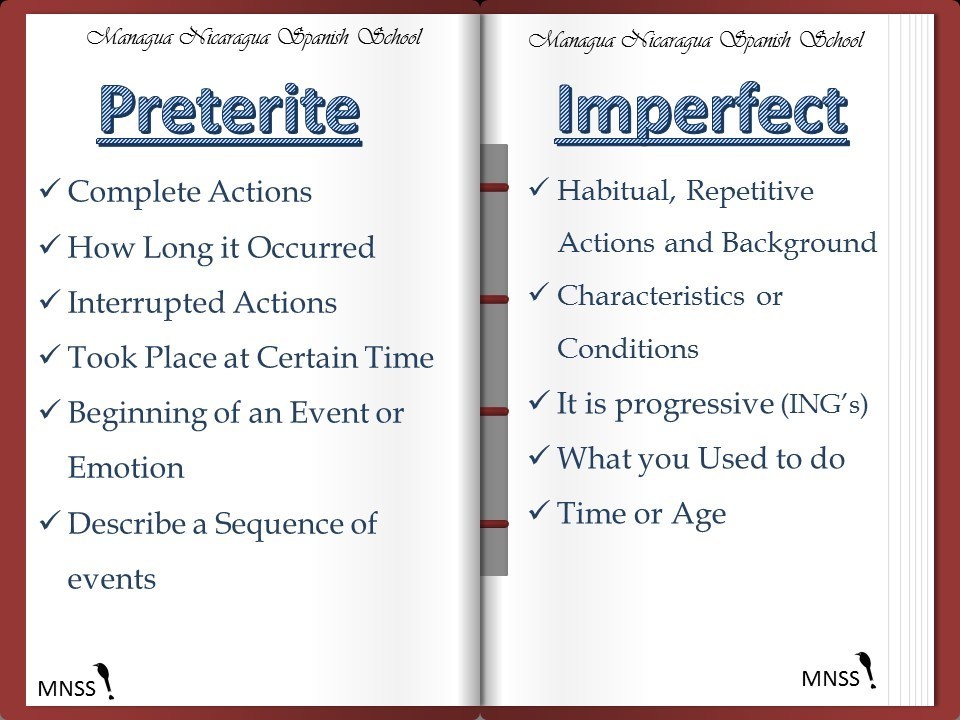In this lesson, we will learn how to use Spanish past tense to talk about actions completed at a point in the past. Basically, there are two major past tenses: Preterite and Imperfect.
Spanish Preterite Tense
Just like other tenses, you will need to learn how to conjugate verbs to match the subject and tense.
Regular Preterite Forms
To conjugate regular preterite verbs, you just need to remove the infinitive ending (-ar, -er, -ir) and add the preterite ending that matches the subject. The table below will show you preterite endings of regular verbs in Spanish.
| Subject | -ar Verbs | -er and -ir Verbs |
| yo | -é | -i |
| tú | -aste | -iste |
| él, ella, usted | -ó | -ió |
| nosotros | -amos | -imos |
| vosotros | -asteis | -isteis |
| ellos, ellas, ustedes | -aron | -ieron |
Note:
- Remember that the preterite forms of yo, él, ella, and usted have tildes on the final vowel. It can change the tense and subject of a sentence.
For examples:
Mandó una carta - He/She sent a letter
Mando una carta - I send a letter
- The endings of regular -ar and -ir verbs for nosotros are the same in both preterite and present tenses. Therefore, you need to consider the context and adverbs of the sentence to figure out it refers to the past or the present.
For examples:
Siempre cocinamos paella los domingos - We always cook paella on Sundays
Ayer cocinamos paella para mi familia - Yesterday we cooked paella for my family
Irregular Preterite Forms
To verbs with irregular preterite forms, you need to memorize their conjugations. Just practice as much as you can.
The table below will show you irregular preterite forms of some common verbs.
| Subject | Ser (to be) | Ir (to go) | Dar (to give) | Ver (to see) |
| yo | fui | fui | di | vi |
| tú | fuiste | fuiste | diste | viste |
| él, ella, usted | fue | fue | dio | vio |
| nosotros | fuimos | fuimos | dimos | vimos |
| vosotros | fuisteis | fuisteis | disteis | visteis |
| ellos, ellas, ustedes | fueron | fueron | dieron | vieron |
Uses of Spanish Preterite Tense
1. To talk about completed events or actions in the past
For examples:
Compré un coche nuevo - I bought a new car
Roberto nació en Costa Rica - Roberto was born in Costa Rica
2. To talk about beginnings and ends in the past
For examples:
Empezó a nevar - It began to snow
La película terminó con una sorpresa - The movie ended with a surprise
3. To talk about past events or actions that occurred on specific times, dates, or periods
For examples:
Regresé anoche a las diez - I got back last night at ten
Vivió en Perú por tres meses - He lived in Peru for three months
4. To list past events in a sequence
For example:
Me levanté, me vestí, y salí para la fiesta
I got up, got dressed, and left for the party
Spanish Imperfect Tense
Regular Imperfect Forms
Just like regular verbs in preterite forms, you just need to remove the infinitive ending and add the imperfect ending that matches the subject.
See the table below:
| Subject | -ar Verbs | -er and -ir Verbs |
| yo | -aba | -ia |
| tú | -abas | -ias |
| él, ella, usted | -aba | -ia |
| nosotros | -ábamos | -iamos |
| vosotros | -abais | -iais |
| ellos, ellas, ustedes | -aban | -ian |
Irregular Imperfect Forms
Below you will find conjugations of three common verbs: ir, ser, and ver.
| Subject | Ir (to go) | Ser (to be) | Ver (to see) |
| yo | iba | era | veía |
| tú | ibas | eras | veías |
| él, ella, usted | iba | era | veía |
| nosotros | íbamos | éramos | veíamos |
| vosotros | ibais | erais | veíais |
| ellos, ellas, ustedes | iban | eran | veían |
Uses of Spanish Imperfect Tense
1. To talk about habitual or repeated actions in the past.
For examples:
Almorzábamos cada día - We used to eat lunch together every day
Todos los sábados las mujeres iban de compras - Every Saturday the ladies would go shopping
2. To talk about an action that was happening when something else interrupted. The action in progress is in the imperfect. And the action that interrupted is in the preterite
For example:
Mi papá cocinaba cuando entré a casa - My dad was cooking when I came in the house
3. To talk about times and dates in the past
Eran las tres de la tarde - It was three o'clock in the afternoon
4. To talk about age in the past
Los perros tenían dos años cuando los adopté - The dogs were two years old when I adopted them
5. To give descriptions of conditions, feelings, or characteristics in the past
Hacía calor esa noche - It was hot that night
Mi profesor era alto y tenía el pelo ondulado - My professor was tall and had wavy hair
See also:

Spanish preterite vs imperfect tense
